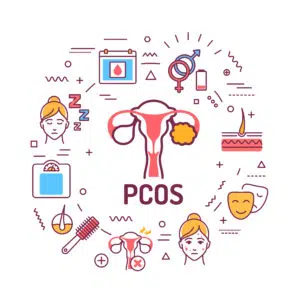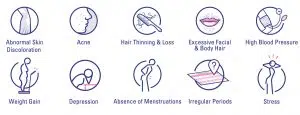
CREDIT: Canada House Clinic
Polycystic Ovary Syndrome (PCOS) is common among five million women around the globe while also harbouring a lack of answers.
The most notable symptoms of the condition involve:
• Irregular or no periods
• Irregular or no ovulation
• Excess facial and body hair
• Thinning or loss of hair
• Weight gain
With an abundance of women affected by PCOS, there is still a lack of funded research and solutions of help in the medical field.
Joyce Prescott can only recall five times of menstruation in her life.
“I’m 77 but [had] PCOS since age 12, [with] many health issues over my life because of it. A complete hysterectomy at 23, lots of issues all my life up to now. Hormone difficulties – not one doctor ever explained anything to me.”
Prescott is part of the growing number of women obtaining little to no explanation about PCOS from doctors.
In addition to the lack of funded research, Rebeckah Nitti is frustrated with the misdirection of funding and information.
“There’s not enough funding behind it to actually tell you what it is or why it’s happening to you. The only solution doctors have in western medicine is to give you birth control. And when you’re trying to conceive, they just blame it on your weight until you lose weight, which is extremely hard to do. But you don’t know why it’s extremely hard to do because they don’t have much research on it. It’s a very bad vicious circle of not enough information.”
Nitti had an inkling she had PCOS by the age of 19. “I headed to the hospital for a really bad cyst. And they told me it was a bad cyst on my ovary. But they didn’t bother looking into it because I was already on birth control and they didn’t care. So I didn’t think much of it,” then Nitti began trying for a baby three years ago with her husband. “I came off birth control, I didn’t have a period foralmost a whole year. And when you go to a doctor, you they just say, ‘Oh, that’s normal. It’s no big problem’, when really, it is a big problem.”
A reoccurring pattern of Nitti having to advocate for herself began.
“When they finally did some tests, they realized I had a quite a few of the markers for PCOS. My family doctor couldn’t deal because she said ‘The only thing I know to do is give you birth control’. I tried a whole bunch of stuff. And it’s not working, nothing’s working.”
In the battle to overcome ovulation obstacles, Nitti has spent a great deal of funds out of pocket to induce ovulation.
“I’ve spent thousands of dollars on IUI to induce ovulation, drugs, and injections that hurt and cost me thousands of dollars. It didn’t even work. I didn’t even create one follicle. My body just doesn’t accept it. And when you try to ask for an answer, they don’t have one. The only help I’ve got is by going to see a naturopath. I can’t afford to do fertility treatments and the naturopath, I have to pick one. Canada doesn’t cover naturopathic medicine. Health plans don’t cover, natural versions of synthetic hormone and that cost a lot of money every month,” Nitti also raises the conversation on classism involved with appointments “Who can afford a $300 naturopath appointment? Not every woman has that privilege. And I know I’m lucky. And I feel really horrible for anyone who’s on lower income. They just have to suffer or go on birth control. Those are the only options they have.”
In the midst of her three year long journey to conceive, Nitti shares the hardest part is the notion of women being naturally conditioned to not question what is told.
“As women, we’re naturally conditioned to not question or not make a problem of things and just trust what we’re being told. And you can’t do that. You literally have to do all the research yourself. You have to advocate so hard for yourself, and it’s exhausting. I fight the medical system literally all the time. And it is exhausting. You have to be prepared to do that for yourself, because no one else is gonna do it for you. There are good doctors out there. They’re not all bad, but you shouldn’t be afraid to find one that works with you and for you.”
More women who have been diagnosed with PCOS are turning to social media to share suggestions of help and give support.
Kimberly Campos was diagnosed with PCOS at 14 years old, and gained a better understanding of her condition through the internet by her 30s.
“I had irregular menstrual cycles, and that was probably one of the clear signs that I had PCOS before I got tested. The hair loss, the stomach pains, I’ve also had acne, hair growth, all that uncomfortable stuff. I’m just finding out in my 30s about it through social media more. There wasn’t that information given to me when I was 15, or by any doctors and there was no type of specialist or anything about it. I didn’t know that it was a common thing amongst other women.”
After expanding on information to understand PCOS for herself more, “It’s just like you’re piecing a puzzle, and things are slow, but it’s something that you really have to be patient with,” Campos highlights the unavailability of a one-size-fits-all answer to the issue. “You have to definitely learn what works for you and what doesn’t work.”
A layered issue women with PCOS face involves the lack of feeling “feminine” in alignment to weight gain and hair growth.
“Definitely my hair growth and the hair loss when I was younger, I definitely did feel less feminine. Now that I see on social media everybody’s just like ‘Hey, you’re not alone in this’ and people trying to help each other out. It’s definitely different these days,” shares Campos. “I learned that there’s four different types of PCOS. You can be mixed with two different types or all four. It’s like your own journey that you kind of feel, even though other people have PCOS. It’s your own journey that you have to still find on your own to suit yourself.”

CREDIT: Pergola
To push the conversation about PCOS through social media, Danielle Howe has created an Instagram that focuses on positivity to combat the popular frustration many feel.
“My journey with PCOS started when I was 14, I was diagnosed super young. It’s definitely been a rough road. Very stressful at times, very painful and I’ve been to the ER a bunch. For my PCOS, I have super painful periods, really bad cramping, cysts, insomnia, anxiety, and hard to lose weight. Sometimes I don’t have a period for a long time, sometimes I have very long periods. It’s definitely been a struggle. I try to stay positive about it and educate others on having it for so long because I’m 28. It’s been quite a few years but PCOS sucks. I just try to make the best of it.”
Howe is motivated to document her journey online highlighting the inconveniences of PCOS, “I haven’t been on birth control for about six years now, because we’ve been trying for baby for five. So it’s been tough. I’ve never really found anything that helps. But I’m hoping with new technology that comes out every year that you know, there will be things that we can do. My symptoms are definitely worse when I’m not on birth control. Definitely infertility is my biggest challenge. I would deal with the symptoms over and over again if I could just get pregnant easily.”
A take away many women are choosing is to stand up to fight for answers of their health.
“You should do your own research and not listen to doctors on ‘There’s nothing you can do’. You need to find out what works for you.” advocates Howe. “It’s worldwide that this is a common thing to have. And I think it needs to be talked about. I also think there needs to be a lot of things worked on. Maybe not a cure someday but something to take away all the symptoms would be nice.”
Campos advises “The sooner you know, the better you are,” while combating discouragement for help. “Definitely don’t take that one answer because I always took that one answer when I was younger, because I didn’t know.”
Although there is no cure for PCOS yet, taking care of your wellness is essential. More information on PCOS and screening for symptoms can be found here.





Comments